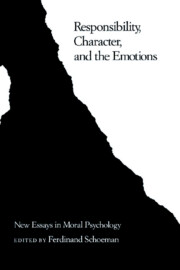Book contents
- Frontmatter
- Contents
- List of Contributors
- Acknowledgments
- 1 Introduction
- Part I Responsibility and Character
- Part II Responsibility and Culpability
- 8 The Moral Worth of Retribution
- 9 Nonmoral Guilt
- 10 Provocation and Culpability
- 11 Responsibility and the Limits of Evil: Variations on a Strawsonian Theme
- 12 Statistical Norms and Moral Attributions
- 13 Guilt, Punishment, and Desert
- 14 Intention, Foreseeability, and Responsibility
- Index of Names
14 - Intention, Foreseeability, and Responsibility
Published online by Cambridge University Press: 03 February 2010
- Frontmatter
- Contents
- List of Contributors
- Acknowledgments
- 1 Introduction
- Part I Responsibility and Character
- Part II Responsibility and Culpability
- 8 The Moral Worth of Retribution
- 9 Nonmoral Guilt
- 10 Provocation and Culpability
- 11 Responsibility and the Limits of Evil: Variations on a Strawsonian Theme
- 12 Statistical Norms and Moral Attributions
- 13 Guilt, Punishment, and Desert
- 14 Intention, Foreseeability, and Responsibility
- Index of Names
Summary
If one says that there is a crucial difference between an intending and a permitting will where moral evil is concerned – as one must – then that must mean that the will relates differently to what it intends and what it permits. Otherwise the distinction is meaningless and arbitrary.
– Richard McCormick, Ambiguity in Moral Choice
If it (the consequent event) is pre-conceived, it manifestly adds to the goodness or badness of the action. For when someone considers that much that is bad can follow from what he does, and does not give it up on that account, this shows that his will is the more inordinate.
– St. Thomas, Summa Theologica
This is not an essay on the doctrine of double effect; for, among other reasons, there seems to be no agreement as to what the doctrine is, or what its role in evaluating acts is supposed to be. However, embedded in any version of that doctrine is a distinction between what one intends and what one merely foresees, and that distinction is supposed to have some bearing on some issue concerning right and wrong, or good and bad, or praise and blame.
This is an essay on the distinction between what we intend and what we merely foresee and on why one might rationally think that such a distinction is relevant in some fashion to issues of responsibility.
The impulse to distinguish between intended and foreseen effects originates in particular cases, although there may be theoretical considerations that bolster such an impulse.
- Type
- Chapter
- Information
- Responsibility, Character, and the EmotionsNew Essays in Moral Psychology, pp. 338 - 354Publisher: Cambridge University PressPrint publication year: 1988
- 1
- Cited by

